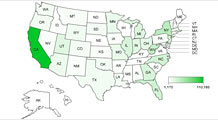Nevermind! States accept jobless help
Governors such as Nevada's Jim Gibbons were blasted for even considering rejecting federal funds. Now he and others have agreed to take the money.
NEW YORK (CNNMoney.com) -- It's not that easy to turn down federal funds.
Several governors who initially voiced concerns about expanding state unemployment benefits to qualify for federal stimulus funds have decided to accept the money. Some were feeling the heat from jobless constituents, while others took comfort in learning recently from the federal Department of Labor that they could curtail eligibility later on.
The benefits expansion is among the most controversial components of the stimulus package, and it comes at a time when millions of people across the nation are losing their jobs. The nation's unemployment rate stood at 8.1% in February and is expected to climb to 8.5% when the March figures are released next Friday.
The American Recovery and Reinvestment Act requires state legislatures to broaden the unemployment guidelines to allow more women, part-timers and low-wage workers to qualify.
In return, the states will get to partake in a $7 billion federal grant aimed at helping the unemployed. At least 19 states automatically qualify for the funds since they already had widened eligibility.
Some state officials, however, are concerned they will have to fund the expanded program by hiking taxes on employers once the federal money runs out. But they were soon hit by a backlash of anger from state lawmakers, unions and jobless residents.
"All the states need the money," said Andrew Stettner, deputy director of the National Employment Law Project, an advocacy group. "There's public pressure and sympathy for the unemployed."
In Nevada, for instance, Gov. Jim Gibbons found himself confronted by state legislators who introduced bills to accept the funds after Gibbons indicated he wouldn't. They chastised him for even considering turning down the $77 million in funds at a time when one in 10 state residents are out of work.
This week, Gibbons became one of the latest governors to sign up for the extended benefits funding as unemployment soars nationwide.
"As our economic crisis deepens, Nevadans are suffering because of layoffs, business closings and other cutbacks," said Gibbons, a Republican. "We have the responsibility to do everything we can to help our unemployed workers get through these difficult times, even if that means passing legislation that we would not necessarily approve during prosperous times."
In Tennessee, Gov. Phil Bredesen made headlines last month when he became one of the few Democratic state executives to question the wisdom of broadening unemployment benefits. His stance prompted local legislators and union leaders to hold press conferences and readers to write letters to state newspapers.
"Absolutely appalling," wrote one Germantown resident to the Commercial Appeal. "I hope the unemployed of Tennessee will write or call the governor to voice their displeasure with his possible refusal of these extended benefits."
The governor ultimately decided to accept the $141 million in stimulus funds.Tennessee's unemployment rate was 8.4% in February. He said it should cover the expanded unemployment benefits for up to six years.
"I took a few days to look at this, to determine just what the long term costs of these benefit improvements would be," Bredesen said in his budget address earlier this week. "You may recall the criticism I took, some of it national, for taking the time to read the fine print. This seems like a good trade off at a time like this, and I recommend that we accept these funds."
Certain governors, however, haven't shifted from their position, despite the public outcry. The Republican governors of Texas, South Carolina, Mississippi and Louisiana are taking a hard line and saying they will not accept the funds because of the potential impact it will have on employers once the federal money runs out.
And in Florida, lawmakers are the ones balking at expanding the rolls, though Republican Gov. Charlie Crist supports accepting the federal funds.
The Florida House leadership this week sent an email to members advising them how to respond if constituents complain about the state's not accepting $444 million in federal funds. Representatives should tell residents that the federal money will only last two months and then businesses will have to cover the costs, potentially prompting them to lay off more workers, the email said.
"This isn't about not being compassionate," said Adam Hasner, House Majority Leader in Florida, where unemployment is at 9.4%. "It's about not making a problem worse." ![]()



